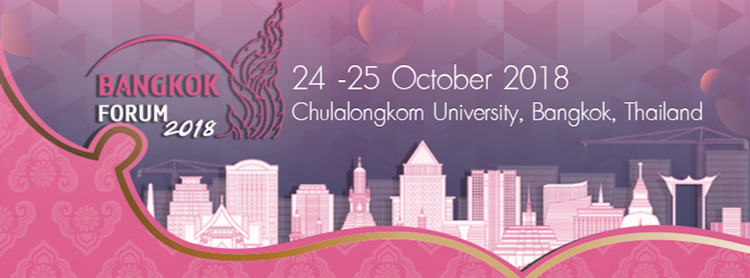"Job Security and Human Skills in the Age of Automation"
Wednesday, 15 November 2017, from 8.00 am. – 1.00 pm. at the Alumni Conference Room, 12th floor, Political Science Building 3, Faculty of Political Science, Chulalongkorn University
Session convened by the Center for Social Development Studies, Master of Arts and Doctor of Philosophy in International Development Studies (MAIDS-GRID), Chulalongkorn University, Samsung Smart Learning Center
The rise of robotics and automation is becoming evident in Asia. According to the International Federation of Robotics, by 2019, more than 1.4 million new industrial robots will be installed in factories around the world, with China being the strongest growing market for the robotics industry.
A recent study by International Labor Organization suggests that over 70% of salaried workers in 5 key sectors in ASEAN countries are at risk of being displaced by automation. The study also points out the need to upgrade STEM (Science, technology, engineering, and mathematics) skills among workers in general. Cloud technology and big data analytics, Internet of Things, and digital marketing are also highlighted to have transformative impacts on jobs in ASEAN.
The roundtable discussion will focus on the above issues and the task universities have in preparing young students to cope with the future. Given the scope of Thailand’s policies on the economy, education and development, the question then arises: what actions could be taken at the state, university and individual levels to make students ready to cope with the automation age.
The Center for Social Development Studies (CSDS), Faculty of Political Science, Chulalongkorn University, in collaboration with The Master of Arts and Doctor of Philosophy in International Development Studies (MAIDS-GRID), Chulalongkorn University, Samsung Smart Learning Center, and collaborative parties would like to cordially invite you to join the seminar on “Job Security and Human Skills in the Age of Automation”. The event will be held on Wednesday, 15 November 2017, from 8.00 am. – 1.00 pm. at the Alumni Conference Room, 12th floor, Political Science Building 3, Faculty of Political Science, Chulalongkorn University. The program details are as follows*:
08.30 – 09.00 Registration
09.00 – 09.10 Welcome Remarks by Kasira Cheeppensook, PhD, Deputy Director, Center for Social Development Studies (CSDS), Faculty of Political Science, Chulalongkorn University
09.10 – 09.20 Objective Remarks by Ms. Sukajit Srisukon, Project Consultant, Samsung Smart Learning Center
09.20 – 09.30 Opening Remarks by Assoc. Prof. Dr. Ake Tangsupvattana, Dean, Faculty of Political Science, Chulalongkorn University
09.30 – 09.50 Mr. Phu Huynh, ILO Employment Specialist and Co-author of “ASEAN in Transformation: How Technology is Changing Jobs and Enterprises”
09.50 – 10.00 Coffee Break
10.00 – 12.00 Roundtable Discussion on “Job Security and Human Skills in the Age of Automation”
– Discussants Assoc. Prof. Dr. Nualnoi Treerat, Director, Institute of Asian Studies, Chulalongkorn University
– Assoc. Prof. Lae Dilokvidhyarat, Distinguished Professor, Faculty of Economics, Chulalongkorn University
– Supot Tiarawut, PhD, Director, Industrial Liaison Program, Faculty of Engineering, Chulalongkorn University
– Mr. Varit Charunyanonda, Senior Manager, Brand Communication, Thai Samsung Electronics Company Limited
– Moderated by Assist. Prof. Jakkrit Sangkamanee, PhD, Center for Social Development Studies (CSDS), Faculty of Political Science, Chulalongkorn University
12.00 – 12.25 Q & A
12.25 – 12.30 Closing Remarks by Assist. Prof. Dr. Naruemon Thabchumpon, Director, MA & PhD Programs in International Development Studies, Faculty of Political Science, Chulalongkorn University (MAIDS-GRID)
12.30 – 13.00 Lunch
* Simultaneous translation will be provided.
To register visit http://bit.ly/2gy5MrS
For more information, please contact tel: 0-2218-7313 or email: maidschula@gmail.com



![PF_ResourcePolitics-AccountabilityPublicSphere[121218]ed.png](https://images.squarespace-cdn.com/content/v1/575fb39762cd94c2d69dc556/1544587414138-WRXU0WDBP8XWJ8X0TYCP/PF_ResourcePolitics-AccountabilityPublicSphere%5B121218%5Ded.png)







![UPCOMING PUBLIC SEMINAR: "Rethinking the Nature/ Culture Divide" By Philippe Descola [10 November 2017]](https://images.squarespace-cdn.com/content/v1/575fb39762cd94c2d69dc556/1508582304364-XXWRD8LRHDSA4K0JUK6T/Screen+Shot+2017-10-21+at+5.36.21+PM.png)


![UPCOMING PUBLIC SEMINAR: "The Politics of the 2011 Bangkok Floods" by Dr. Danny Marks [4 May 2017]](https://images.squarespace-cdn.com/content/v1/575fb39762cd94c2d69dc556/1492810084460-JJK7PJNFPUXHU9C2M4LX/Marks_4.5.17.jpg)
![UPCOMING PUBLIC SEMINAR: "Web of Relations: The Way of Giving, Taking and Reciprocating in the Moken’s World" by Dr. Narumon Arunotai [28 April 2017]](https://images.squarespace-cdn.com/content/v1/575fb39762cd94c2d69dc556/1492771900521-P466YI3IO3R4U70832UG/Arunotai_28.4.17.jpg)
![UPCOMING PUBLIC SEMINAR: "Understanding an Active Volcana: Animism and Naturalism in Central Javanese Society" by Adeline Martinez [24 February 2017]](https://images.squarespace-cdn.com/content/v1/575fb39762cd94c2d69dc556/1494910732388-HT4BL8K635OZIY43TQM0/volcano.jpeg)
![UPCOMING PUBLIC SEMINAR: "Politics of Nature Conservation in Thailand" by Dr. Pinkaew Laungaramsri [20 January 2017]](https://images.squarespace-cdn.com/content/v1/575fb39762cd94c2d69dc556/1494910850230-THAE5UZID2DDWZ3ZX71W/download+%281%29.jpeg)
![UPCOMING PUBLIC SEMINAR: "Building Infrastructures. Monitoring Development" by Casper Bruun Jensen [24 January 2017]](https://images.squarespace-cdn.com/content/v1/575fb39762cd94c2d69dc556/1494911248864-LB9QSFD97P30TOTM6NMI/casper.jpeg)
![UPCOMING PUBLIC SEMINAR: "The Visual of Walls: Borders, Flows and Morality by Prof. William A Callahan [21 November 2016]](https://images.squarespace-cdn.com/content/v1/575fb39762cd94c2d69dc556/1494913094904-5P07LDPGXQ9MJ8Z4X7Q7/callahan.jpg)
![UPCOMING PUBLIC SEMINAR: "Beyond Nature and Culture of Modern Thai Water Engineering, the Ontology of Infrastructure" by Jakkrit Sangkhamanee [16 December 2016]](https://images.squarespace-cdn.com/content/v1/575fb39762cd94c2d69dc556/1494913161726-F7WY3MO43525W2BNBXUH/jakkrit.jpeg)
![UPCOMING PUBLIC SEMINAR: "Societies and Environments in Southeast Asia" [November 2016 - November 2017]](https://images.squarespace-cdn.com/content/v1/575fb39762cd94c2d69dc556/1494913281211-V00U0RRKEK7DGZWC8V7Y/Seminar-poster01_RVB-lowres.jpg)